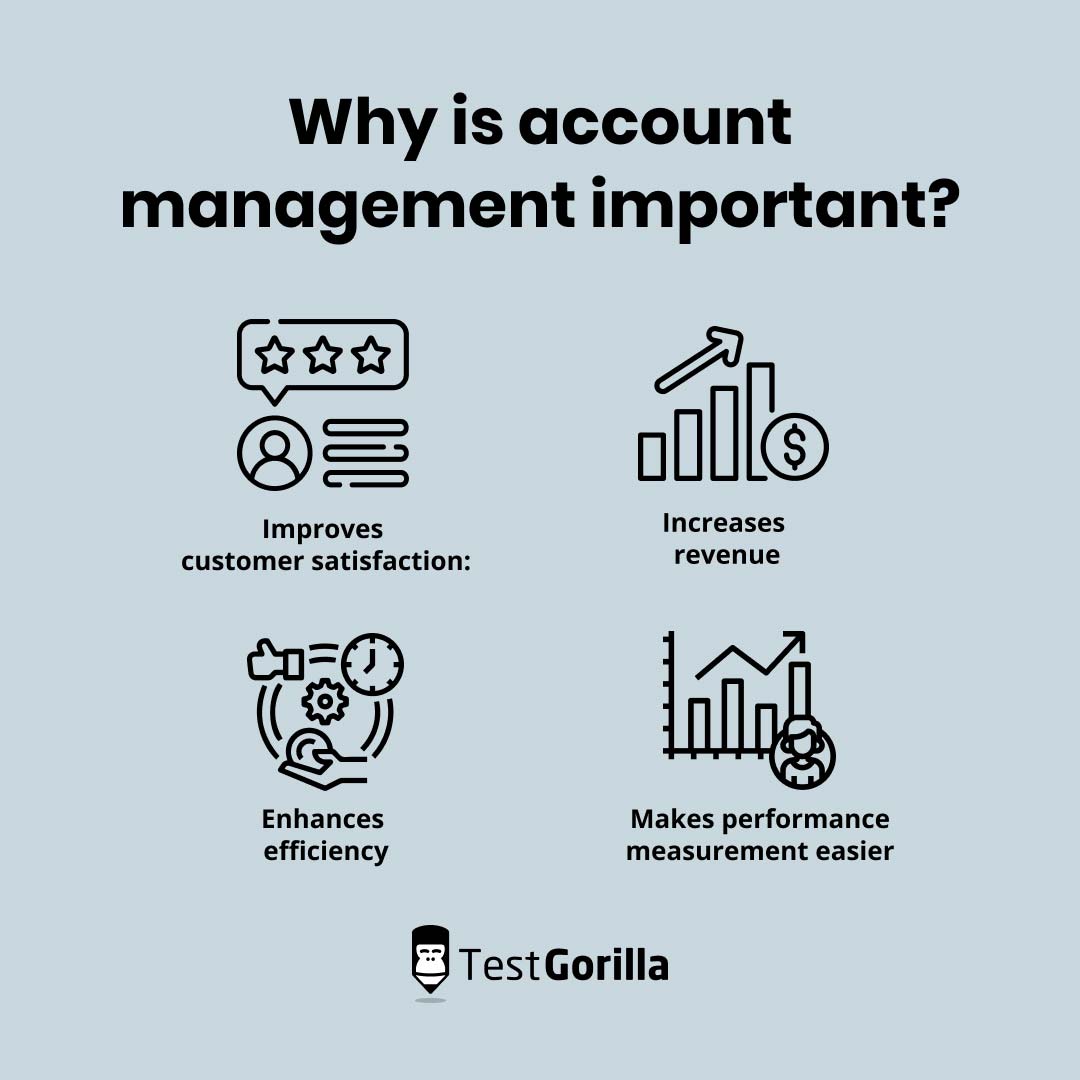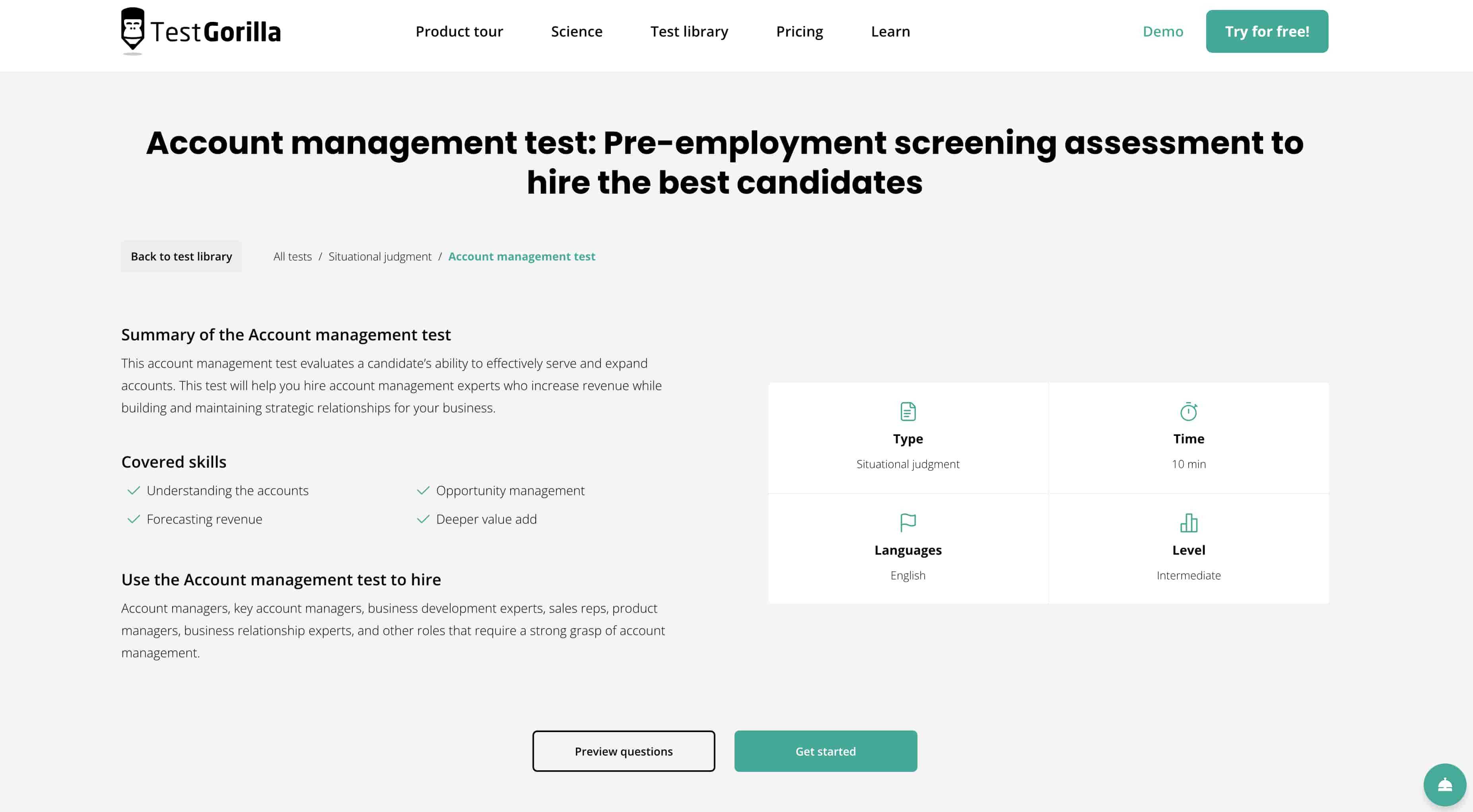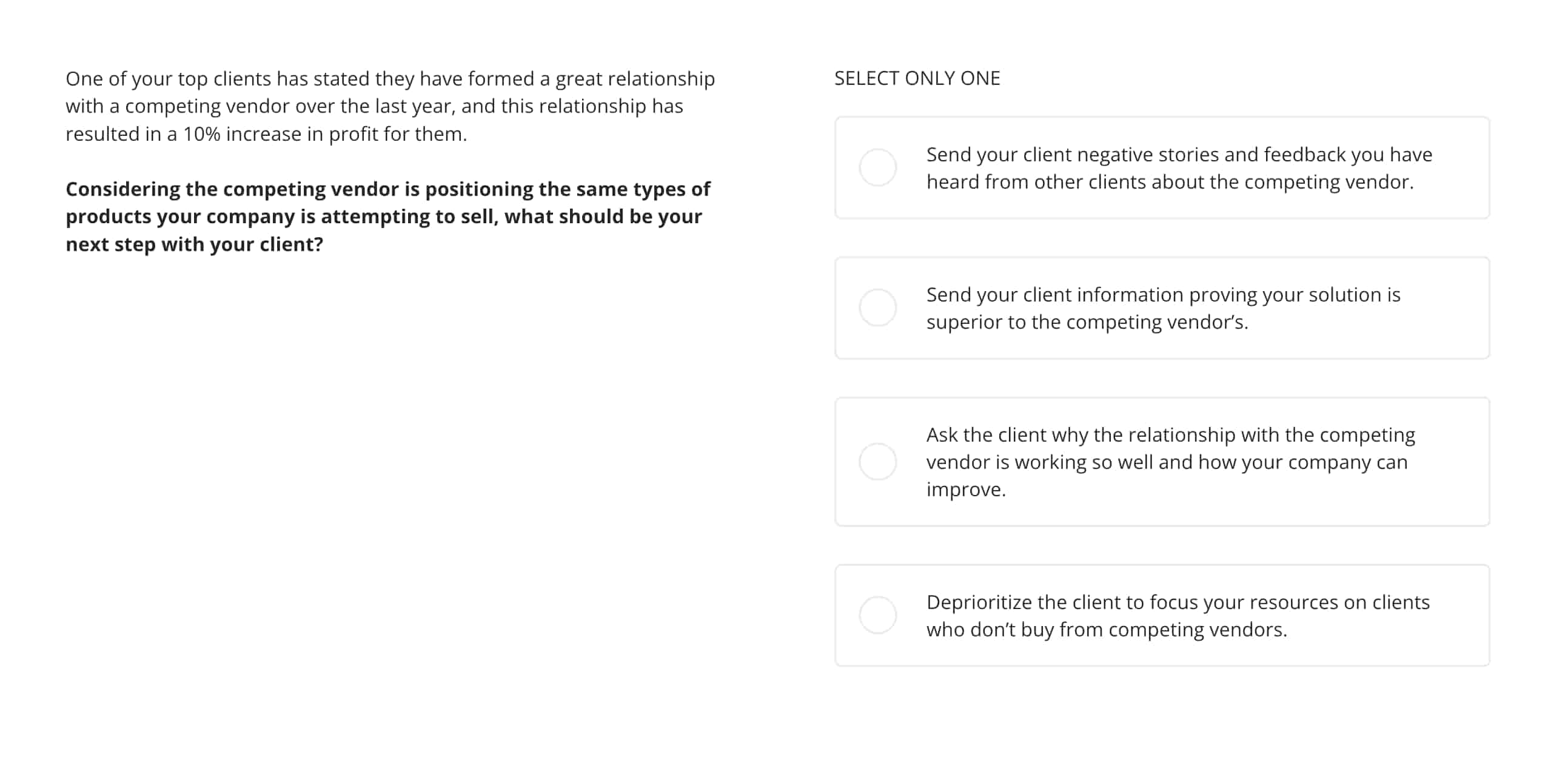Successful account managers add significant value to your business through relationship building and turning potential customers into loyal customers. They're also great at providing proactive service, retaining customers, and keeping up with industry trends.
But how do you find and hire the best account managers?
Evaluating account manager skills can be challenging if you don’t have the right recruitment process in place. However, a quality pre-screening test like TestGorilla’s Account Management test can help you find top account managers for your team and gauge account management skills.
Keep reading to learn more about account managers, how they can help your business improve revenue growth, and the skills to assess if you're on the lookout for account managers. You'll also learn about the most efficient way to test your candidates on these core skills.
What is an account manager?
An account manager is an intermediary between a client and your business. Many account managers oversee the day-to-day interactions with your clients to build strong relationships and improve your customers’ experience.
What does an account manager do?
Account managers, also known as account executives, have to play multiple roles in an organization. Sometimes, they may serve as sales reps, customer service representatives, or even product trainers. At other times, they may serve as financial advisors providing strategic perspective.
Typically, an account manager builds and maintains strong client relationships, ensuring satisfaction and maximizing sales opportunities. They act as the primary contact between clients, internal teams, and various departments, understanding their needs and developing tailored solutions.
Apart from managing clients with existing accounts, they also help the company grow and maximize profits by creating and implementing strategies to acquire new customers.
Most account managers also identify upselling and cross-selling opportunities, address customer concerns, and provide regular updates and reports to clients and stakeholders. They play a vital role in fostering long-term client relationships, driving customer loyalty, and contributing to business growth and profitability.
In addition, account managers may cater to key customers’ needs. This approach is often referred to as key account management (which we'll explore in the next section).
Learn more: A day in the life of an account manager at Edgard Cooper, a pet food company based in Belgium.
The best insights on HR and recruitment, delivered to your inbox.
Biweekly updates. No spam. Unsubscribe any time.
Key account management vs. account management: How are they different?
While an account manager and a key account manager share common objectives and responsibilities, there are distinct differences between the two roles. Both positions involve managing relationships with clients or customers, but the scope and focus of their work vary.
Traditional account managers typically handle a broader customer base and are responsible for maintaining strong relationships with a range of clients and customer accounts. On the other hand, key account management (KAM) concentrates on building and maintaining key relationships with a select group of strategic clients, also known as key accounts.
Here's a table summarizing the similarities and differences between account managers and key account managers:
Account manager | Key account manager |
|---|---|
Manages a broader customer base | Focuses on a select group of accounts |
Ensures overall client satisfaction | Builds deep relationships with key stakeholders |
Handles various clients and sales activities | Engages in strategic account planning |
Provides support across the customer lifecycle | Drives mutual value and growth for both the business and key accounts |
Why is account management important?
Good account management is crucial for maintaining customer relationships, measuring performance, and seizing business opportunities. Here are the different ways to utilize effective account management to benefit your business:
1. It helps improve client satisfaction
Excellent account management facilitates a harmonious long-term relationship by building customer satisfaction. The more satisfied customers are with your exceptional customer service, the more they want to continue doing business with you.
Furthermore, account management will provide you with specific insights on services your clients are dissatisfied with, allowing you to make improvements.
2. It enhances efficiency while capitalizing on opportunities
Account management, when done well, improves efficiency. It can help identify trends and explores new ventures. In short, it fosters growth in a dynamic business landscape.
3. It increases revenue
Optimizing resources for each project, which is crucial to increase revenue, is key to effective account management. This leads to an even more profitable investment. Additionally, better customer experience leads to improved customer retention and repeat sales.
4. It makes performance measurement easier
Account management simplifies performance measurement by setting goals with clients, maintaining regular communication and feedback loops, organizing client-related information, and promoting collaboration. This enables account managers to track progress, analyze metrics, identify key success factors, and drive ongoing success.
You may also like: Looking for an Account Manager job description template? This ready-to-go template has everything you need to hire your next, great account manager.
10 skills every top account managers should have
Exceptional account managers have a combination of hard and soft skills, making them stand out from the rest. Although the required skills may vary between industries, there are some core skills any professional account manager should have.
Let's take a look at these essential skills for account managers.
1. Communication skills
Excellent communication skills are a must for account managers. These include active listening, non verbal communication, and adapting to various communication styles.
As an active listener, an account manager demonstrates genuine interest, helping understand client needs.
Next, account managers should also be aware of nonverbal cues to communicate effectively. Maintaining eye contact, using open and welcoming body language, and speaking in a confident and friendly tone can convey trustworthiness, empathy, and professionalism. These nonverbal signals help account managers establish rapport and build trust with clients, fostering a positive working relationship.
Finally, the best account managers are flexible in adapting their communication style to align with the client's preferences and needs. For example, each client may have unique communication preferences, such as a preference for concise emails, detailed reports, or face-to-face meetings.
Recommended reading: Your hiring team’s guide to workplace communication tests
2. Analytical skills
Analytical thinking skills is another essential skill every account manager should have. It involves identifying a problem’s causes and offering suitable solutions to clients. This skill also enables them to identify opportunities and determine if they’re worth pursuing.
3. Ability to adapt
A client's needs may change over time, but they still require an account manager's input and service. Your account manager should be flexible enough to adapt to clients’ demands while proposing new strategies that will deliver more value to the client and keeping them engaged.
Recommended reading: Best practices for hiring adaptable employees that won’t get burnt out
4. Knowledge of the market
Market knowledge and expertise is another crucial skill that every successful account manager should have. Understanding new technologies, the competitive landscape, and industry trends enables them to provide valuable insights to clients.
5. Willingness to learn
A willingness to learn helps your account manager stay up-to-date and relevant in your industry. It also enables them to seek feedback often and understand customer needs better.
For example, willingness to learn is a critical skill for account managers in supply chain management. Imagine an account manager responsible for managing a key client's supply chain operations. The client introduces a new software system to streamline their inventory management processes. Instead of resisting change, a good account manager embraces this opportunity. They take the initiative to understand the new software thoroughly, attend training sessions and familiarize themselves with its functionalities.
As a result, they gain valuable knowledge about the technology and become a resource for the client, providing guidance on how to integrate the software effectively into their supply chain operations.
6. Sales skills
Sales skills are essential for account managers as they play a crucial role in driving revenue and maintaining strong client relationships. Account managers must understand the sales process and techniques to closing sales.
They should also know how to collaborate with the sales team and provide valuable insights, market knowledge, and customer feedback. Their understanding of the sales process allows them to support sales reps in overcoming challenges, addressing objections, and closing deals successfully.
Recommended reading: 10 traits to look for when hiring salespeople (and how to evaluate them)
7. Interpersonal skills
Interpersonal skills in account management involve team management, collaboration with internal departments, and conflict resolution in the workplace.
In addition, account managers must be able to relate to multiple clients to strike profitable deals on your behalf. The should also possess empathy to understand the specific needs of customers, nurturing relationships and providing lifetime value for long term relationships.
8. Leadership skills
Leadership skills are crucial for account managers, who often act as business partners, driving mutual benefit and fostering collaborative relationships.
For instance, imagine an account manager working with a key client in the manufacturing industry. The client is facing challenges related to operational efficiency and cost reduction. The account manager takes a leadership role by proactively analyzing the client's processes, identifying areas for improvement, and proposing innovative solutions.
They might also collaborate with cross-functional teams within your organization to develop a comprehensive strategy that addresses the client's needs.
9. Project management skills
Account managers with project management skills excel at handling complex projects for existing customers while maintaining great relationships with them.
For example, imagine an account manager overseeing a software upgrade for one of your key accounts. Acting as a project manager, they coordinate resources, set timelines, and ensure effective communication. As a result, the account manager successfully completes the upgrade, meeting project goals while nurturing the client relationship.
Learn more: How to assess project manager skills and competencies
10. Organizational skills
Account managers are responsible for organizing and managing the accounts of clients. They can handle as little as one account to as many as 20.
Consider an account manager in the advertising industry who manages a diverse portfolio of clients. They meticulously organize client data, contracts, and project details systematically. When faced with competing priorities, the account manager prioritizes tasks effectively, ensuring timely delivery and client satisfaction.
Recommended reading: How to assess organizational skills
How to test account management skills
Account management is constantly evolving, so employees in this role must be well-informed of the developments in the industry. It also demands they have the technical skills to remain relevant and valuable for your business.
Resumes don’t cut it when hiring. You should use an alternative means to determine if prospective employees genuinely have the industry skills you are looking for.
Integrating a pre-employment test into your recruitment will help you select the best hire effortlessly.
TestGorilla’s Account Management test allows you to assess candidates’ skills using real-life scenarios to check their decision-making, prioritization, and sales techniques.
preview of TestGorilla's Account Management test
Upscale your account manager hiring process with TestGorilla
Selecting the right account manager is essential for nurturing client relationships and driving business growth.
Incorporating skills testing into your recruitment process can help you identify and find suitable account management candidates. Sign up with TestGorilla to access a comprehensive range of tests.
New to pre-employment testing? Check out this complete guide on the benefits of pre-employment testing for employers.
You've scrolled this far
Why not try TestGorilla for free, and see what happens when you put skills first.


















